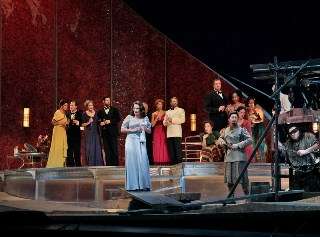|
Back
Met Salome Revival Disappoints New York
Metropolitan Opera
12/05/2016 - & December 9,* 13, 17, 24, 28, 2016
Richard Strauss: Salome, op. 54
Kang Wang (Narraboth), Carolyn Sproule (Page), Nicholas Brownlee (First Soldier), Richard Bernstein (Second Soldier), Zeljko Lucic*/Greer Grimsley (Jochanaan), John Hancock (Cappadocian), Patricia Racette (Salome), Kathryn Day (Slave), Gerhard Siegel (Herod), Nancy Fabiola Herrera (Herodias), Allan Glassman (First Jew), Mark Schowalter (Second Jew), Noah Baetge (Third Jew), Alex Richardson (Fourth Jew), David Crawford (Fifth Jew), Mikhail Petrenko (First Nazarene), Paul Corona (Second Nazarene), Reginald Braithwaite (Executioner)
The Metropolitan Opera Orchestra and Chorus, Johannes Debus (conductor)
Jürgen Flimm (production), Santo Loquasto (sets and costumes), James Ingalls (lighting), Doug Varone (choreography)

(© Ken Howard/Metropolitan Opera)
It has been eight years since Richard Strauss’s searing opera of lust, perversion, incest, seduction, and murder crossed the Met’s stage. Scandalous at its house premiere in 1907 – it was removed from the repertoire after its first Met performance and did not return for 27 seasons – and occupying its own tantalizing place in the operatic firmament ever since, it is hard to imagine that Salome could ever be boring. But sadly, this short revival (six performances through December 28) has proved otherwise.
Jürgen Flimm’s production of 2004 still looks reasonably fresh. The setting is a vaguely interwar Middle East haunted by religious fanaticism and scary angels of death whose head-to-toe black robes unnervingly anticipate ISIS fighters. Sometimes it wavers toward the obvious – why put in angels of death when we already know death will come? – but in more capable hands the visual concept was never the problem. Here, at the second performance, the German conductor Johannes Debus tried to take a cerebral approach. He led the orchestra with care, but so much care that the score’s manic energy and hair-raising dissonances passed like an uneventful Sunday afternoon. Perhaps he was aiming for subtlety, but Salome is not a subtle work. His misapplied reading of the score fell flat too often to explore its harmonic richness or deliver any appreciable emotional charge.
Patricia Racette, who replaced the originally announced Catherine Naglestad, has never ranked among the most exciting of singers. Her Met career has been a progression of competent but far from outstanding performances across the dramatic repertoire. Following Debus’s insipid lead did not help. But consistent weakness in the lower range, high notes marred by excessive vibrato, and stage action that bordered on the subdued forced the conclusion that the Met might have more wisely relied on a host of other excellent exponents of the role now performing to fill Naglestad’s shoes. Producing little effect, Racette’s most depraved moments scored so low on the excitement scale that the audience occasionally reacted with laughter rather than terror. In perhaps twenty performances of the opera, I have never encountered such an amused response.
The performance was not devoid of vocal talent. Gerhard Siegel’s robust tenor captured the weird idiosyncrasies of Salome’s stepfather Herod as well as anyone around. Nancy Fabiola Herrera’s Herodias was entertainingly hissable. Kang Wang makes a fine company debut in the lesser but noticeable role of Narraboth. Zeljko Lucic was probably miscast as Jochanaan, the opera’s John the Baptist character. He brought stentorian baritone tones but lacked the bass resonance characteristic of more successful interpreters. The comprimario parts were admirably filled out by the Met’s talented roster singers, some still very early in their careers. Nevertheless, Strauss’s monument to depravity deserved better.
Paul du Quenoy
|